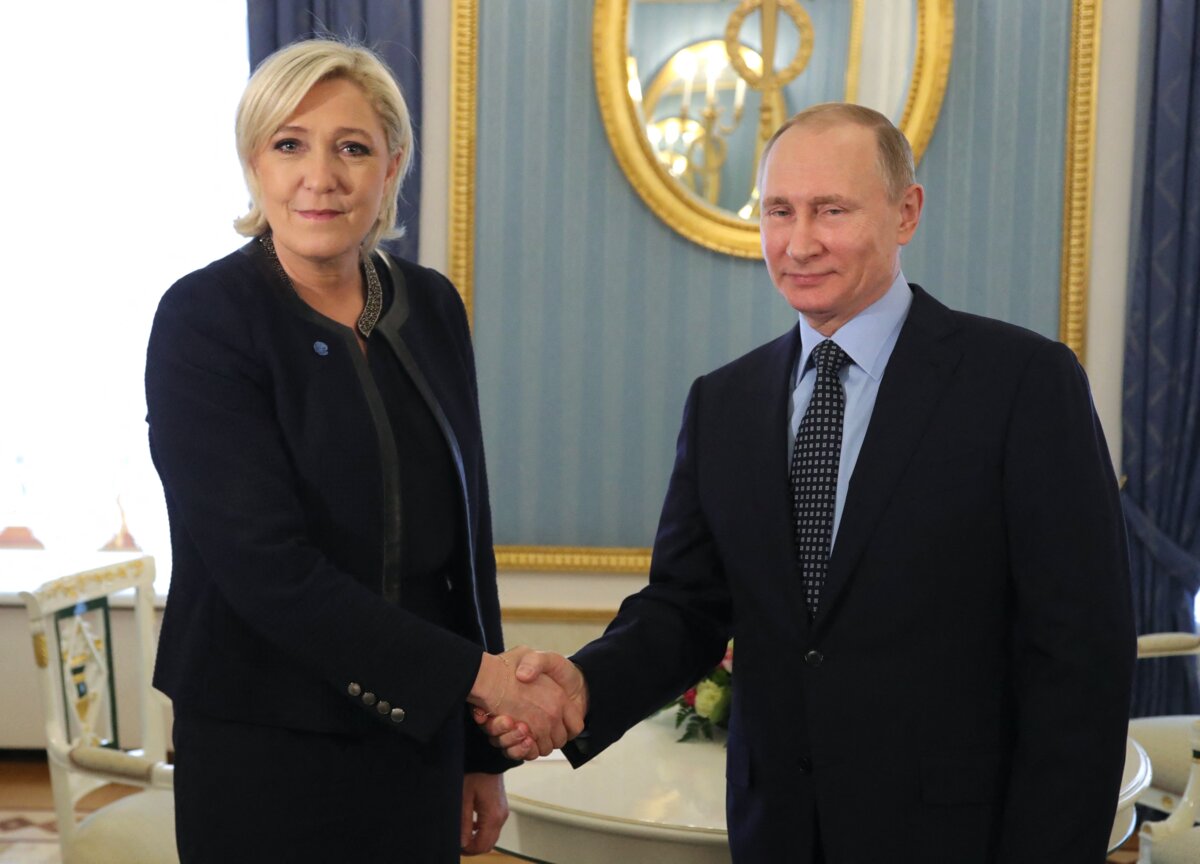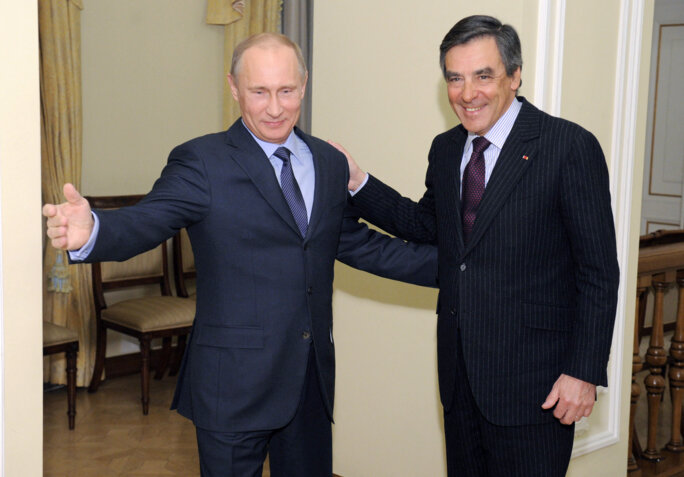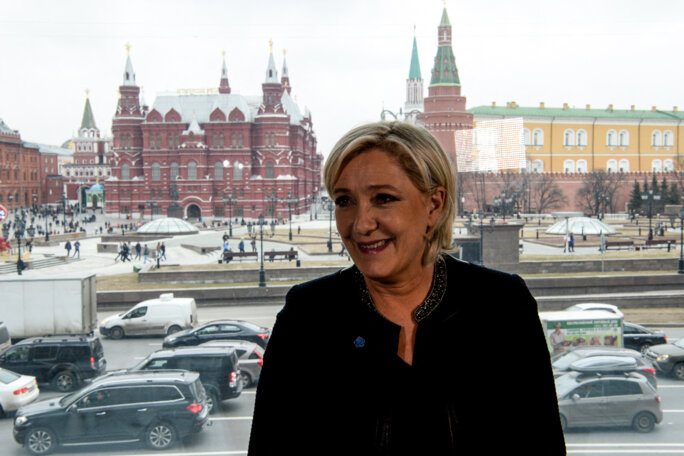The Russian invasion of Ukraine on February 24th brought an abrupt end to the ambitions of its campaign to promote its standing and influence in western Europe. France has long been one of the principal targets of the Kremlin’s soft-power strategy, successfully building Russian influence notably among political and business circles.
In this interview with Mediapart’s Marine Turchi, French political scientist and historian Marlène Laruelle, director of the Institute for European, Russian and Eurasian Studies (IERES) at the George Washington University, a specialist in post-Soviet Russian affairs, offers an insight into the history and detail of the soft power influence Russia has wielded in France, and at very different levels.
-------------------------
Mediapart: Has Russia’s soft-power campaign in France been greater than in other countries?
Marlène Laruelle: The Russians have led a strategy of influence notably in France and Germany, two countries of central importance for Europe, using different networks and strategies, but this has worked better in France than in Germany.
France is considered by the Russians to be potentially more receptive to their soft power because of, in part, the history of Russian immigration and the Gaullist tradition, but also the idea that the French are a little more anti-American, [and] have a little more pro-Russian tradition than other European nations – or at least no historical conflict with Russia. They also played on a cultural aspect.
On the French side, there has been a certain receptiveness to Russian [policy] lines, notably among the far-right and a section of the Catholic Right.
There is also the fact that all the major French companies are very present in Russia, and in much more diverse sectors than gas and oil alone. Whereas the connection with Germany is above all around gas, in France – and apart from Total – implanted in Russia are [utility giant] Veolia, the luxury goods industry, and agroindustry groups like Bonduelle and Auchan.

Enlargement : Illustration 1

Mediapart: What are the means used by the Russians in France to expand their influence?
M.L.: The principal lever, which is often overlooked, is that of economic diplomacy. The whole of of the CAC 40 [editor’s note, the benchmark French stock market index] does business in Russia – or did so up until two weeks ago. The ‘Dialogue franco-russe’ [an association created and co-presided by far-right French politician Thierry Mariani] is a crucial tool. It brings together the big names among the CAC 40, has legitimacy and provides access to political figures. The ‘Dialogue’ was really thought up as a classic lobbying association. The aim was to converse with the CEOs of the large French companies present in Russia – Total, Auchan, Renault etc. – and to try to open a dialogue with parliamentarians. The aim was very concrete: to glean votes opposing sanctions, and to try to diminish their impact.
Then there were also all the activities of the Russian embassy in France – cultural, para-economic, a sociability towards businessmen – and those of the Natalya Narochnitskaya institute, now closed down since several years, which succeeded in a dialogue with a certain number of parliamentarians, people from the traditional Right, well beyond a far-right public.
Mediapart: A tool of influence that is often cited is that of the pro-Russian media. What has been their impact?
M.L.: That is an overestimated lever in my view. In particular, Russia Today [RT, a state-owned TV channel]. The channel convinces people who are already outside mainstream opinion, and who are critical of ‘the system’ and liberal elites. If you read [French dailies] Le Monde and Libération, you’re not going to watch RT. Perhaps it attracts readers of [conservative-leaning daily] Le Figaro, who radicalize themselves watching RT. Sputnik [a Russian state-owned news agency, radio and web platform] is more influential because it upsets the internet landscape.
But the few academic studies available about the influence exerted upon the electorate show that their audience remains a niche one, with a more limited influence than is claimed.

Enlargement : Illustration 2

Mediapart: Russia has built up an important strategy of influence through political parties, notably the far-right.
M.L.: The ideological aspect is less visible but, indeed, there are a whole lot of connections with the far-right and, more widely, with the traditional Right. The revival of Catholicism in France was an unexpected side to pro-Russian opinion. At the time of the 2012-2013 ‘Manifs pour tous’ [demonstrations in France against the introduction of the same-sex marriage legislation], and the 2017 Fillon candidature [presidential election bid by conservative former prime minister François Fillon], Russia discovered that there was a whole slice of the traditional Right with which it could communicate; a Catholic upper middle-class with conservative values and pro-Russian. François Fillon’s campaign was very exciting for the Russians. They really believed that they could have a French president who was won over by the Russian line. After his defeat, they had to turn back again to the Front National [far-right party].
Mediapart: How far back does the Front National’s attraction to Russia go, and how were the networks between the Kremlin and the French far-right put in place?
M.L.: There are personal contacts that go back in time – as of the end of the 1960s, Jean-Marie Le Pen [founder of the Front National] had knotted ties with Russian nationalist circles – but which had no consequence on the official policy line of the Front National. As of 2007, and Putin’s speech in Munich [in which he notably attacked the US for creating a unipolar world] it became more visible. Then, in 2011, Marine Le Pen [who that year succeeded her father Jean-Marie as head of the Front National] established the pro-Russian line as official policy of the Front National. Russia became a symbol of reference, a tool, to demonstrate it [the party] was not mainstream.
What Marine Le Pen had wanted to do with her party, she also did in her relationship with Russia. She didn’t meet with Aleksandr Dugin – a fascistic ideologue, high priest of Eurasianism, and too marginal – but with Vladimir Putin. She cast aside the ultra-radicals, the neo-Nazi groups, and sought to have direct access to the seat of power, with members of the government, inside the Duma and its president Sergey Naryshkin, with the [French association] Dialogue franco-russe and with businessmen.
What came into play were the French delegations which travelled to Crimea, in the Donbas, in 2014 and 2015 [after the Russia’s annexation of the Crimean Peninsula]. Once you accept to visit Crimea, it gives you direct access to the Russian powers that be. That’s how networks were built up, little by little, resulting in the official meeting with Putin [and Marine Le Pen] in 2017.
Mediapart: It is also because of a lack of partners that Russia turned to the Front National. Did 2012, with the electoral defeat of Nicolas Sarkozy, mark a turning point?
M.L.: Yes. In 2012, Nicolas Sarkozy left the Élysée, but Russia also went through a turning point, with Putin’s third mandate, when he radicalised his speech on conservative values, [and with] the large demonstrations. The Kremlin then had no choice; the pro-Russians remaining on the [French] political scene are from the far-right, except for a few people on the Left, more nuanced. Moreover, after 2014 and the economic sanctions, Moscow no longer had access to teams from the governments of the traditional Right. The Russians worked with what they could. When they were able to ally themselves with traditional conservatives, like Fillon in France, or [former social democrat chancellor, Gerhard] Schröder in Germany, they preferred them to the far-right.
But, also, they have an angle of analysis which gives more importance to the far-right than it has in reality. It was a miscalculation for influence. In a way, they believed their own propaganda, being in denial of the ‘normality’ of liberalism in Europe. They were certainly disappointed with Marine Le Pen’s score in 2017 [when she was defeated in the presidential elections by Emmanuel Macron].
But it must be understood that this interest in the far-right is not generalised within the Putin regime. Strong tensions existed, some were against the alliance with the far-right, arguing that one cannot ally oneself to the far-right when one presents one’s country as being anti-fascist. Others were in favour. When Marine Le Pen met with Duma president Sergey Naryshkin, it caused tensions among a section of the Russian elite.

Enlargement : Illustration 3

Mediapart: In 2014, the rapprochement went further, when Russia granted two financial loans, totalling around 11 million euros, to the Front National. Did that influence the political line of the party?
M.L.: It was really a question of ideological affinity. That said, the money oils the system of course. It helps and accelerates things, but they didn’t have to do a U-turn, there was already the will for intercourse with Russia.
Mediapart: Did any oligarchs contribute to this rapprochement?
M.L.: There are two types of oligarchs. There are those who spend their money according to what the powers in place ask them to do. Over recent years, Putin clearly set these oligarchs to work: so and so was to buy Fabergé eggs, another was to finance the Sotchi [winter] Olympics, etc. So they have missions which are handed to them by the state, to which they cannot say ‘no’ – one must be a friend of the regime to be able to use one’s money.
Then there are the oligarchs who have their own ideological agenda, like Vladimir Yakunin [ex-head of Russian Railways and former co-president of the association Dialogue franco-russe] and Konstantin Malofeev. They have their own specific ideological niche, with the validation of the regime. They are both major reactionaries who have connections for ideological reasons with the French far-right, sharing the same vision of the world – to the difference of Putin, who partnership with Marine Le Pen is above all strategic.
Mediapart: Russian billionaires are very present in France, in Paris and on the Riviera, and invest massive sums, notably in property. Is that also part of Russia’s strategy to gain influence?
M.L.: It is firstly a way of taking their money out of Russia, to try and live the good life in the West. It is both a way of gaining protection from the regime if something happens and to make investments in Europe, even money laundering. Often, their ‘foundations’ are offshore structures. When one looks at the members of the management of foundations belonging to Malofeev and Yakunin, these are people based in Geneva, who have financial investment companies in Cyprus. So, one guesses that there are financial reasons for their presence in Europe.
But the oligarchs were also progressively activated by the regime as intermediaries to exert local influence, with each one specialised in a certain type of influence. They are essentially concentrated on the Riviera and in major ski resorts like Courchevel. The Russian oligarchs are an internationalised jet set, they mix with men from Qatar and the Emirates on holiday in France, with aristocrats, with billionaires from around the world, with sports stars or cinema stars. These will then be instrumentalised, be invited to so-and-so’s birthday in exchange for millions of dollars.
One tends to overlook these networks of influence, or not take proper measure of them, but they have been very important for Putin’s diplomacy for years in the sense that the regime has succeeded in internationalising itself and to be legitimate in different circles. The para-diplomacy of the jet set is soft power.
Mediapart: Some oligarchs also finance Orthodox churches in France, which constitutes another tool of influence.
M.L.: Yes, absolutely. There is a double logic behind this financing. There’s the classic logic of an oligarch who has made money and who wants to do a good deed, but also the logic of creating discreet influence. By financing Orthodox churches, they are attempting to take back control of Russian communities, or more largely Orthodox communities – Greek, Armenian, Romanian – and they meanwhile build networks at a municipal level. That allows them to wield influence in a town like Cannes, for example.
Mediapart: What are the consequences on Russian soft power of the war in Ukraine and the international sanctions now imposed?
M.L.: The soft power built up by Russia over the years has been destroyed in a matter of days, and for several years to come. With regard to its position in the media, the influence is diminishing. On the economic front, companies are withdrawing from Russia. From a political point of view, the brand ‘Russia’ will be difficult to sell. Even the far-right is currently obliged to put the brakes on its pro-Putin statements to save face with regard to French public opinion, which is now largely anti-Russian.
-------------------------
- The interview with Marlène Laruelle, translated above into English, was originally conducted in French, and can be found here.
English version by Graham Tearse


